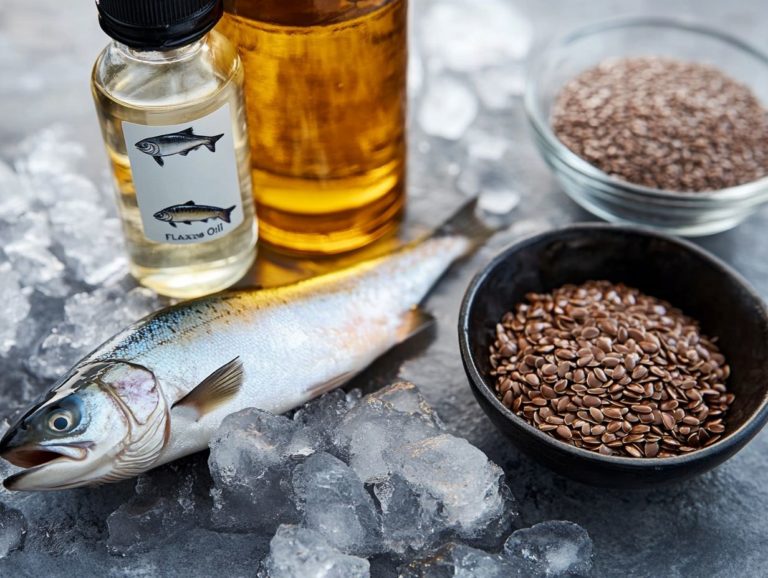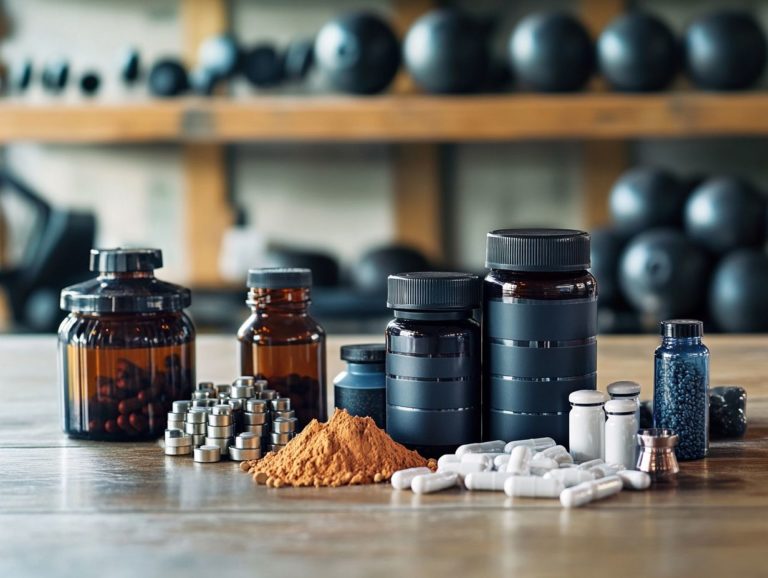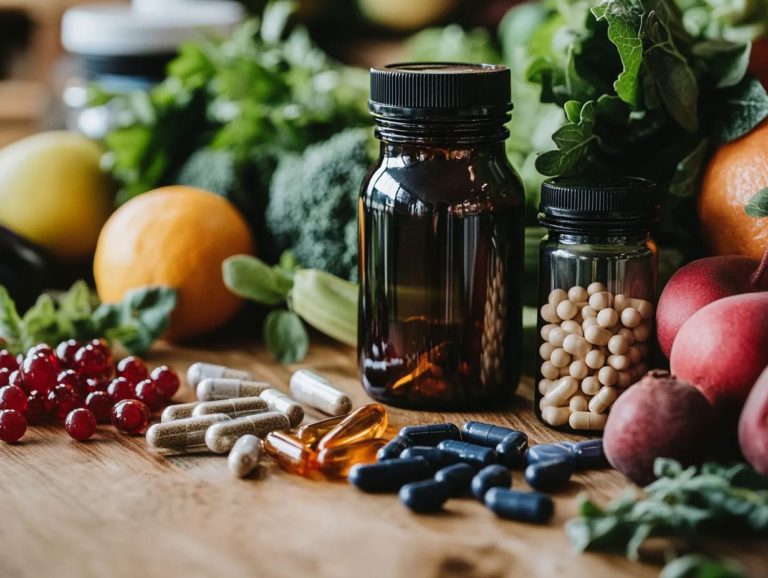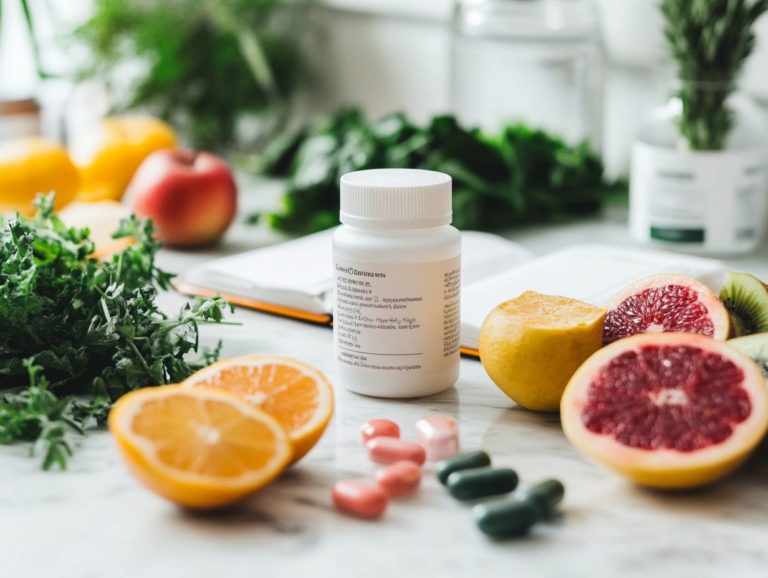5 Must-Have Supplements for Athletes
Athletes frequently pursue peak performance, yet reaching those lofty goals often necessitates a touch of additional support. Let s dive into these powerful supplements that can transform your training and maximize your results! It s time to unlock your full athletic potential.
This article delves into five essential supplements that can elevate your training and recovery: protein supplements, creatine, BCAAs (Branched-Chain Amino Acids, which include leucine, isoleucine, and valine), omega-3 fatty acids, and vitamin D. You will also find information on dosages, side effects, and natural sources.
Each of these supplements serves a distinct purpose in enhancing athletic performance, from promoting muscle growth to mitigating inflammation. Don’t wait! Start incorporating these supplements today to boost your performance and recovery!
Contents
- Key Takeaways:
- 1. Protein Supplements
- 2. Creatine
- 3. BCAAs
- 4. Omega-3 Fatty Acids
- 5. Vitamin D
- How Do These Supplements Benefit Athletes?
- What Are the Different Types of Protein Supplements?
- How Does Creatine Help with Athletic Performance?
- What Are the Benefits of BCAAs for Athletes?
- Why Are Omega-3 Fatty Acids Important for Athletes?
- How Does Vitamin D Affect Athletic Performance?
- What Are the Recommended Dosages for These Supplements?
- Are There Any Risks or Side Effects of Taking These Supplements?
- What Are Some Natural Sources of These Supplements?
- How Can Athletes Incorporate These Supplements into Their Diet?
- What Are Some Alternatives to These Supplements?
- Frequently Asked Questions
Key Takeaways:
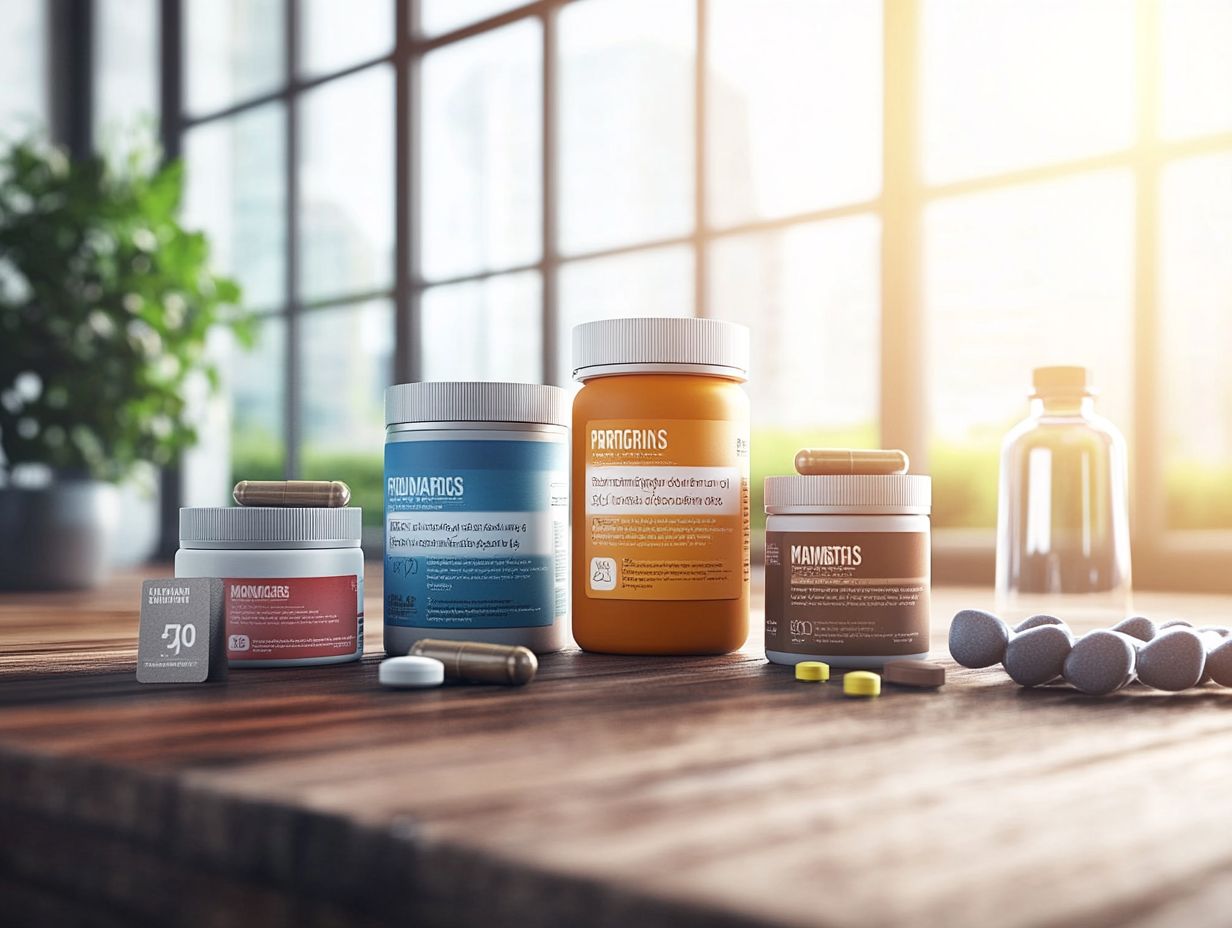
Protein supplements are essential for muscle repair and growth, and can be found in different forms such as whey, casein, and plant-based options. Creatine is beneficial for increasing energy and endurance during high-intensity workouts. BCAA supplements help with muscle recovery and reduce muscle fatigue.
1. Protein Supplements
Protein supplements are essential for you as an athlete seeking to enhance muscle mass, optimize recovery, and elevate your overall performance during both training and competition.
With various types available, including whey protein for quick absorption, casein for sustained release, and plant-based options like pea or hemp, each offers unique advantages tailored to your specific needs.
For instance, whey is perfect for post-workout recovery thanks to its rapid digestibility. Meanwhile, casein can work wonders when taken before sleep, supporting overnight muscle repair.
Incorporating these protein sources into your supplementation plan not only aids in muscle recuperation but also plays a vital role in maintaining optimal energy levels during your training sessions. This ensures you can consistently perform at your peak.
Without sufficient protein intake, you risk struggling with fatigue and subpar performance, underscoring the necessity of prioritizing these essential nutrients.
2. Creatine
Creatine stands out as one of the most effective supplements for athletes like you who aim to enhance performance, especially in high-intensity and explosive sports.
By boosting the availability of phosphocreatine in your muscle tissues, creatine supplementation enhances ATP (adenosine triphosphate) production, providing rapid energy during challenging workouts and aiding muscle recovery afterward.
This powerful compound helps athletes improve strength and endurance. When used correctly, creatine gives you the power to push beyond your limits, enhancing performance in activities such as sprinting and weightlifting.
Typically, you might start with a loading phase of around 20 grams per day for the first week, followed by a maintenance dose of 3 to 5 grams daily. It’s vital to be aware of potential side effects, including gastrointestinal discomfort and muscle cramping.
Since creatine draws water into your muscles, keeping yourself properly hydrated is crucial to ensure you reap the optimal benefits while minimizing the risk of dehydration.
3. BCAAs
BCAAs are essential for you as an athlete looking to enhance muscle recovery and elevate your training performance.
Comprising leucine, isoleucine, and valine, BCAAs play a crucial role in reducing muscle soreness, preventing muscle breakdown, and improving endurance during lengthy workout sessions.
By incorporating BCAA supplementation into your diet, you can experience significant enhancements in exercise capacity and overall recovery. These benefits become even more vital when you’re a competitive athlete, pushing your limits through intense training.
BCAAs help stave off fatigue, allowing you to extend your training sessions comfortably. They also stimulate protein synthesis, which is key for building and repairing muscle tissue.
If you prefer natural sources, you’ll find BCAAs abundantly in high-protein foods like chicken, beef, eggs, and dairy products. Many athletes turn to BCAA supplements for their convenience, ensuring they meet daily requirements, especially before or after workouts to maximize muscle recovery and performance.
4. Omega-3 Fatty Acids
Omega-3 fatty acids, especially from fish oil, are essential for athletes looking to boost muscle recovery and support joint health. These nutrients have powerful anti-inflammatory properties that reduce muscle soreness, speeding up recovery after intense training sessions.
Omega-3s also help with hydration and cardiovascular health, making them a crucial part of your supplement plan.
Incorporating omega-3s into your diet enhances joint mobility, allowing you to train effectively and with less discomfort. Regularly eating foods like salmon, flaxseeds, and walnuts provides rich sources of these fatty acids. Recommended dosages typically range from 1,000 to 3,000 milligrams per day, tailored to your individual needs.
Maintaining optimal omega-3 levels boosts your performance and lowers the risk of chronic inflammatory conditions, enhancing your long-term health and athletic longevity.
5. Vitamin D
Vitamin D is crucial for athletes, impacting bone health and enhancing overall performance. It regulates calcium and phosphorus, essential for strong bones and optimal muscle function.
When vitamin D levels are adequate, you ll feel more energized and recover faster, solidifying its role as a key dietary component.
Note that natural sources like fatty fish, fortified dairy, and egg yolks significantly contribute to your vitamin D intake. Sunlight exposure is one of the best ways for your body to synthesize this important nutrient.
If you train indoors or live in areas with limited sunlight, consider supplementation. It s wise to consult a nutritionist to determine the best dosage for your needs.
By ensuring your vitamin D levels are optimal, you can support performance and speed up recovery.
How Do These Supplements Benefit Athletes?
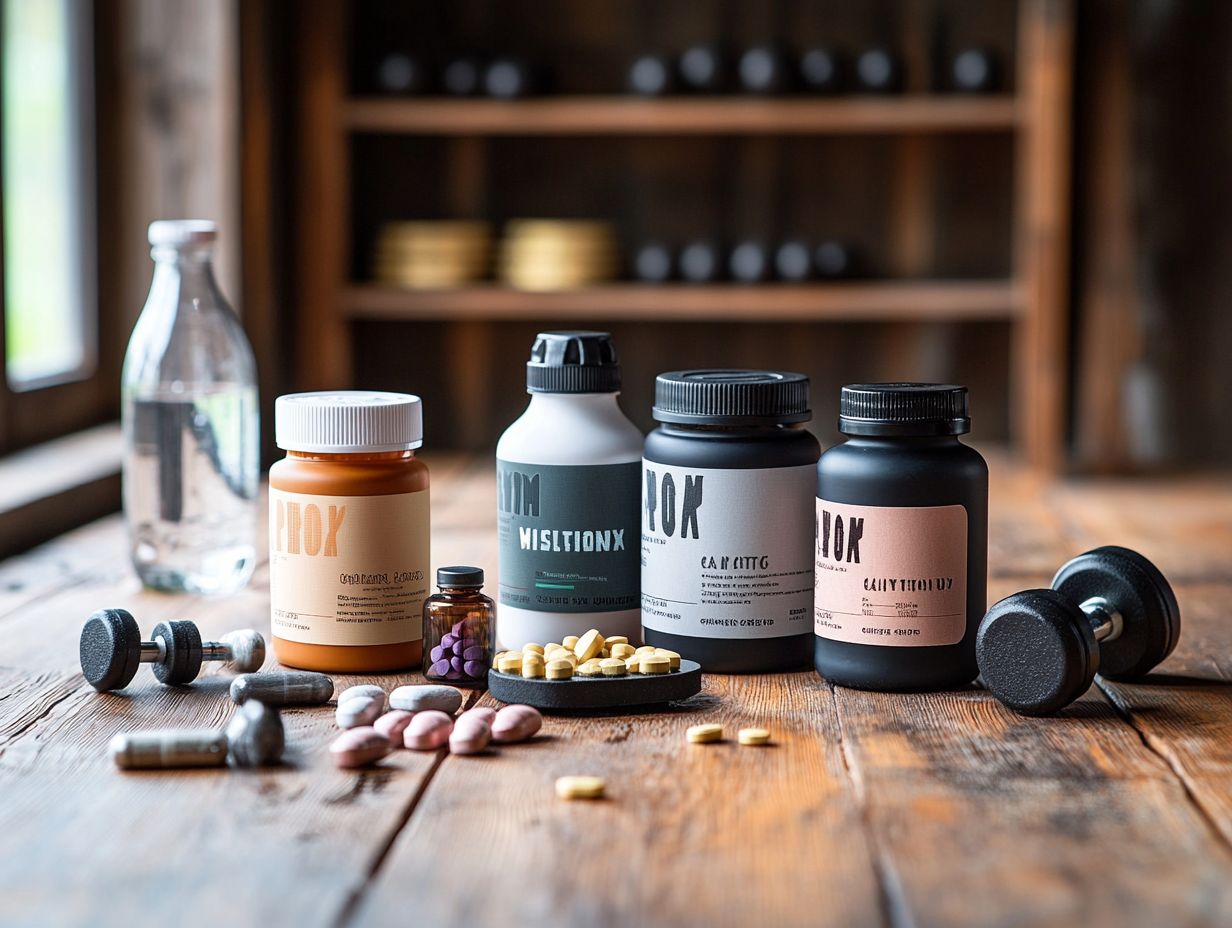
You can greatly enhance your athletic performance and recovery with a well-rounded supplement strategy that includes protein, creatine, BCAAs, omega-3 fatty acids, and the best supplements for muscle gain.
Incorporating these nutrients tackles unique challenges and elevates your capabilities.
A personalized supplementation plan considers factors like training intensity, dietary preferences, and health conditions, ensuring you receive the optimal blend for your goals.
When these supplements are tailored to you, they work together to boost energy, speed up muscle repair, and maintain overall well-being, leading to improved performance.
For this reason, it s crucial to consult a sports nutritionist or dietitian to develop a strategy that aligns with your individual needs and aspirations.
What Are the Different Types of Protein Supplements?
There s a wide array of protein supplements available, each designed for athletes and fitness enthusiasts eager to enhance recovery and performance.
From whey and casein to plant-based options like pea and hemp protein, each has unique advantages. Whey protein is known for rapid absorption, making it great for post-workout shakes, while casein provides a slow release of amino acids, ideal for nighttime recovery.
Selecting the right protein supplement can significantly impact your training outcomes. If you follow a vegetarian or vegan lifestyle, plant-based proteins help with muscle repair and align with your ethical beliefs.
Some protein types might cause digestive discomfort, emphasizing the need for personalized selection. By understanding the distinct characteristics of each protein type, you can optimize performance and recovery, aligning your choices with your dietary needs and fitness goals.
How Does Creatine Help with Athletic Performance?
Creatine is often hailed as one of the most effective performance supplements for athletes like you. It enhances energy production during high-intensity training and competition.
By boosting phosphocreatine stores in your muscles, creatine optimizes ATP regeneration, which is critical for explosive movements and sustained exertion.
This results in improved strength, increased muscle mass, and enhanced overall athletic performance, making it a staple in many athletes’ supplementation routines.
Creatine also benefits sports requiring quick bursts of speed, agility, and power, such as sprinting, weightlifting, and team sports like basketball and soccer.
The key lies in how it works not just increased energy availability, but also better muscle recovery and reduced fatigue, giving you the strength to train harder and more frequently.
To effectively incorporate creatine into your training regimen, consider starting with a loading phase, followed by a maintenance dose. This strategy maximizes benefits while minimizing any potential gastrointestinal discomfort.
Don t wait talk to a healthcare professional today to customize your supplement plan!
What Are the Benefits of BCAAs for Athletes?
Branched-chain amino acids (BCAAs) provide numerous benefits for athletes, especially when it comes to muscle recovery and performance enhancement during training.
By alleviating muscle pain and fatigue, BCAAs allow you to maintain the intensity and frequency of your workouts.
They promote the synthesis of new muscle proteins, which is crucial for recovery and strength gain, making them an essential addition to your supplement repertoire.
Research indicates that BCAA supplementation can significantly reduce exercise-induced muscle damage, enabling quicker recovery between intense training sessions.
In a compelling study, participants who consumed BCAAs after their workouts reported a noticeable decrease in muscle soreness compared to those who did not. Such rapid recovery is vital for athletes like you who follow demanding training schedules.
Incorporating BCAAs into your nutrition plan is easy; you can consume them before, during, or after workouts. Whether you choose supplements or opt for food sources like chicken or eggs, you can ensure optimal intake aligned with your dietary needs.
Why Are Omega-3 Fatty Acids Important for Athletes?
Omega-3 fatty acids are vital nutrients for you as an athlete, playing a critical role in promoting overall health, enhancing recovery, and boosting athletic performance.
These fatty acids come packed with anti-inflammatory properties that can effectively reduce muscle soreness and joint pain, allowing you to maintain a consistent training routine.
Plus, omega-3s support cardiovascular health, perfectly aligning with your need for optimal blood flow and energy levels during competition.
Adding omega-3-rich foods to your diet can supercharge your performance! Fatty fish like salmon, mackerel, and sardines are excellent sources, supplying essential nutrients necessary for muscle repair and endurance.
If fish isn’t a regular part of your meals, consider plant-based options like chia seeds, flaxseeds, and walnuts as alternatives.
When training intensity ramps up or dietary restrictions come into play, supplementation might be a wise choice. Fish oil or algae-based supplements can effectively bridge any gaps, ensuring you meet your omega-3 needs to support both your physical performance and overall well-being.
How Does Vitamin D Affect Athletic Performance?
Vitamin D plays a pivotal role in enhancing athletic performance by influencing muscle function, immune response, and overall health. Ensuring adequate levels of vitamin D is important for optimal calcium absorption, essential for maintaining bone strength and facilitating muscle contractions.
Maintaining sufficient vitamin D levels may lead to improved recovery times, reduced injury rates, and enhanced performance in your chosen sports. This underscores its significance in any supplementation strategy.
Research indicates that vitamin D deficiencies can lead to muscle weakness and increased susceptibility to infections, both of which can severely impede performance. Therefore, maintaining optimal vitamin D levels is crucial, particularly during months when sunlight is scarce.
Incorporating a balanced diet rich in fatty fish, fortified dairy products, and egg yolks can significantly boost your vitamin D levels. If you struggle to meet your requirements through diet alone, supplements can provide a practical solution.
Regular testing helps create a personalized approach, ensuring you effectively meet your unique needs.
What Are the Recommended Dosages for These Supplements?
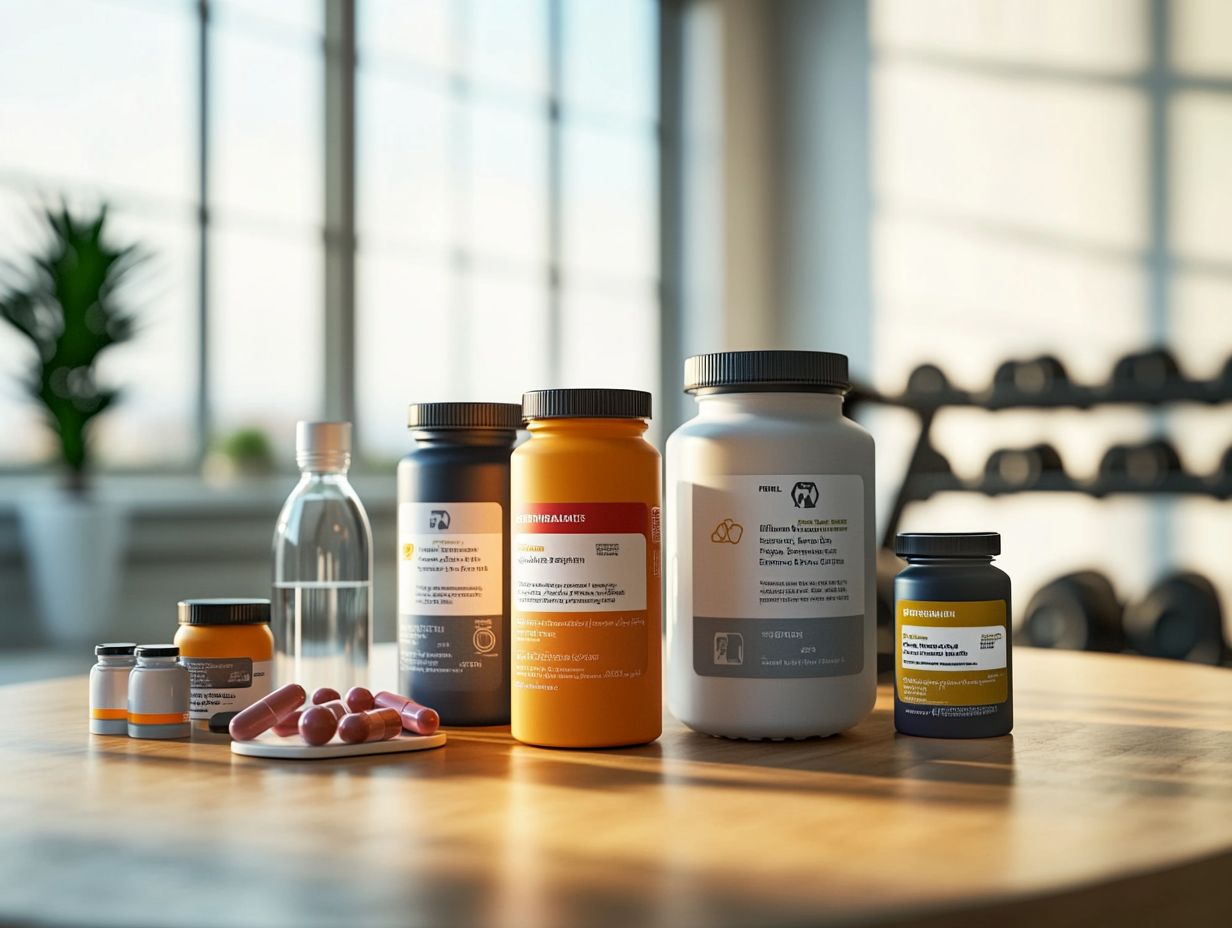
Understanding the recommended dosages for supplements like protein, creatine, branched-chain amino acids (BCAAs), omega-3 fatty acids, and vitamin D is essential for athletes striving to optimize both health and performance. Proper dosage ensures maximum benefits while minimizing the risk of side effects.
For instance, consider starting with a loading phase of creatine at around 20 grams per day, then transition to a maintenance dose of 3-5 grams. Your protein intake will likely vary based on individual needs and training intensity.
Typical guidelines suggest aiming for approximately 1.2 to 2.2 grams of protein per kilogram of body weight, especially if you re engaged in rigorous training. Any supplementation plan should be tailored to your specific regimen and overall health status.
Not every athlete will respond the same way to each supplement, so consulting with a healthcare professional before starting any regimen is vital. You will receive personalized advice that helps you choose the most effective and safe approach to supplementation.
Are There Any Risks or Side Effects of Taking These Supplements?
While supplements like creatine, BCAAs, omega-3 fatty acids, and vitamin D can offer significant advantages, you must understand the risks to perform at your best!
For example, excessive creatine might lead to gastrointestinal discomfort or dehydration, while high doses of omega-3s can thin your blood or affect your immune function. By understanding these risks, you can make informed choices about your supplementation strategy.
Sticking to recommended dosages is essential to minimize adverse effects and ensure your body can effectively utilize nutrients without being overwhelmed.
Each person reacts differently to supplements. Monitor your responses and adjust your intake accordingly. Some may find themselves bursting with energy and recovering faster, while others might face unexpected side effects like headaches or digestive issues.
This careful approach allows you to create a more personalized supplementation regimen, promoting optimal performance while minimizing health risks.
What Are Some Natural Sources of These Supplements?
Athletes seeking to elevate their nutrition can greatly benefit from natural sources of supplements like protein, omega-3 fatty acids, and vitamin D, which offer the same advantages as their synthetic alternatives.
For instance, lean meats and dairy products serve as outstanding sources of protein, while fatty fish such as salmon and mackerel are packed with omega-3s. Sunlight provides a natural dose of vitamin D, but you can also turn to dietary options like fortified foods and egg yolks to meet your needs.
Incorporating these foods into your daily regimen can significantly enhance performance and recovery times. Imagine starting your day with a breakfast of Greek yogurt topped with nuts and berries this not only boosts your protein intake but also delivers antioxidants that help reduce inflammation.
For lunch, a salad featuring grilled chicken or tuna, dressed with a vinaigrette made from olive oil, can provide you with healthy fats and essential vitamins.
Don’t forget to snack on walnuts or flaxseeds throughout the day to ensure a steady supply of omega-3s, which support joint health and heart function. Just by making these small changes, you can optimize your nutrition naturally and unlock your full athletic potential.
How Can Athletes Incorporate These Supplements into Their Diet?
Incorporating supplements like protein, Creatine, Branched-Chain Amino Acids (BCAAs), omega-3 fatty acids, and vitamin D into your diet can be a straightforward process with a bit of thoughtful planning and awareness of your food needs.
You ll find that strategically timing protein shakes post-workout, sourcing daily omega-3s from fish or supplements, and ensuring adequate vitamin D levels through both diet and sunlight exposure can greatly enhance your performance.
Meal prep is your best ally in making these supplements a regular part of your daily routine. For example, blending protein powder into your smoothies or oatmeal can transform an ordinary breakfast into a nutrient-rich meal.
Consider scheduling BCAA consumption during your workouts to help maintain energy levels, and mixing Creatine into your pre- or post-exercise snacks for optimal results. Don t overlook hydration, especially with electrolyte-rich water, as it plays a vital role in supporting muscle function and recovery.
By employing these practical strategies, you can effortlessly weave supplements into your routine without feeling overwhelmed.
What Are Some Alternatives to These Supplements?
Athletes seeking alternatives to traditional supplements have a wealth of nutrient-rich foods and natural options at their fingertips, offering similar benefits without relying on commercially produced supplements.
Whole food sources like quinoa, legumes, and nuts serve as fantastic protein substitutes, while chia seeds and flaxseeds are excellent sources of plant-based omega-3s. By incorporating a diverse array of whole foods into your diet, you can effectively meet your nutritional needs and enhance both performance and recovery.
Options like sweet potatoes and brown rice provide complex carbohydrates, which are crucial for maintaining sustained energy during your training sessions.
Green leafy vegetables such as spinach and kale are brimming with vitamins and minerals that bolster immune function essential for anyone facing a grueling training schedule.
Fruits like bananas and berries can also be seamlessly included as natural sources of antioxidants, aiding in muscle recovery and reducing inflammation.
By thoughtfully weaving these wholesome options into your daily meals, you can achieve a balanced intake of essential nutrients, promoting not only improved athletic performance but also overall well-being.
Frequently Asked Questions
Here are some common questions about supplements for athletes.
What are the 5 must-have supplements for athletes?
- Protein powder
- Creatine
- BCAAs
- Fish oil
- Vitamin D
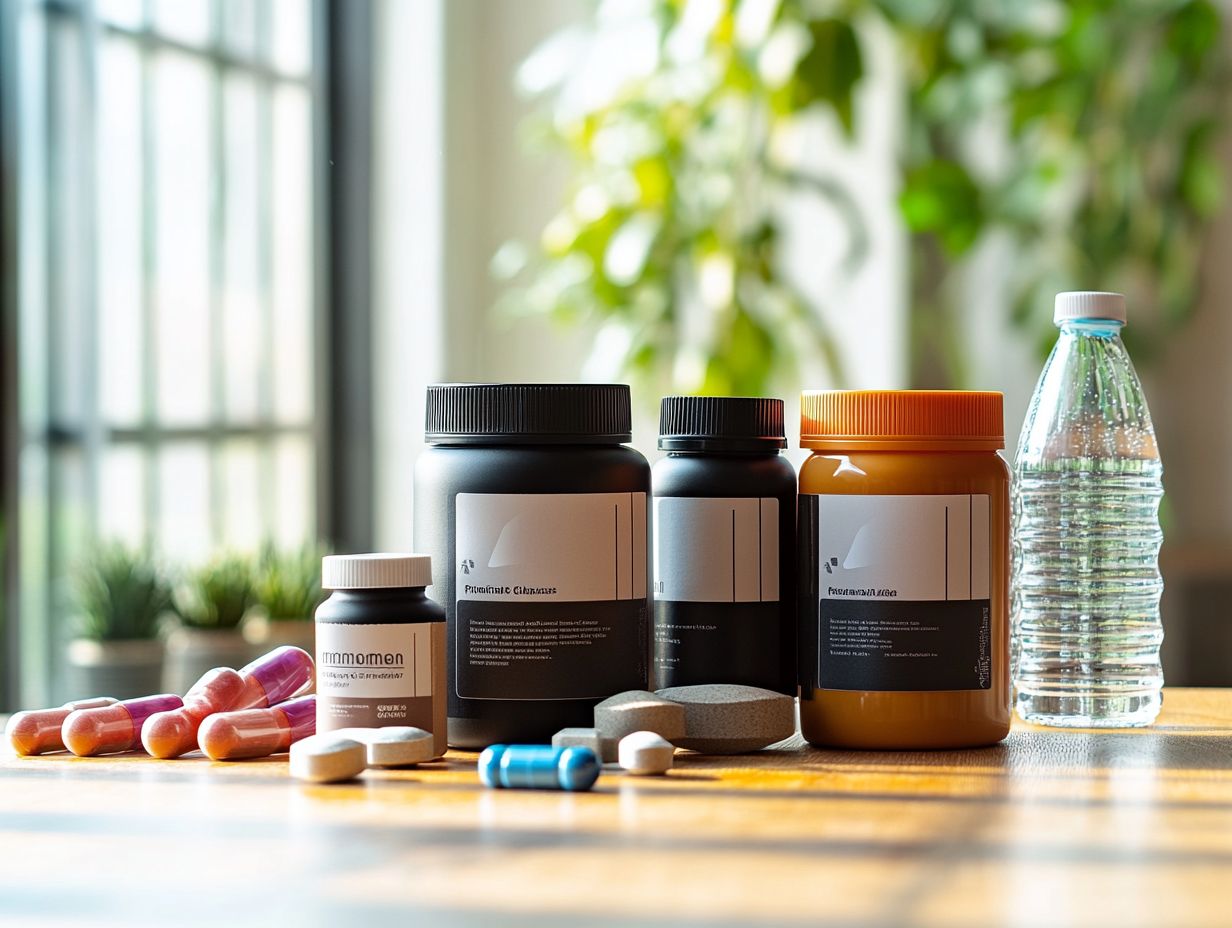
The 5 must-have supplements for athletes are protein powder, Creatine, BCAAs, fish oil, and vitamin D, but understanding dietary guidelines for athletes is also crucial for optimal performance.
Why is protein powder essential for athletes?
Protein powder is essential for athletes because it helps with muscle recovery and repair, promotes muscle growth, and supports a strong immune system.
How does Creatine benefit athletes?
Creatine helps athletes by providing them with more energy and strength, allowing them to train harder and perform better. It also aids in muscle growth and recovery.
Don t wait! Start incorporating these foods today to transform your performance.
What are the benefits of BCAAs for athletes?
BCAAs, or branched-chain amino acids, help with muscle growth. They reduce muscle fatigue and improve performance.
Why is fish oil important for athletes?
Fish oil is crucial for athletes. It contains omega-3 fatty acids that reduce inflammation and exercise-induced soreness.
Why do athletes need vitamin D?
Vitamin D is vital for athletes. It supports bone health, muscle function, and immune response.

